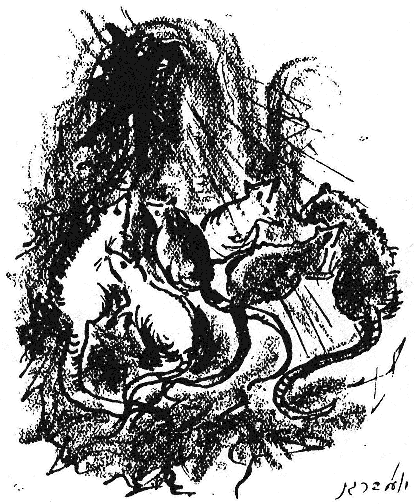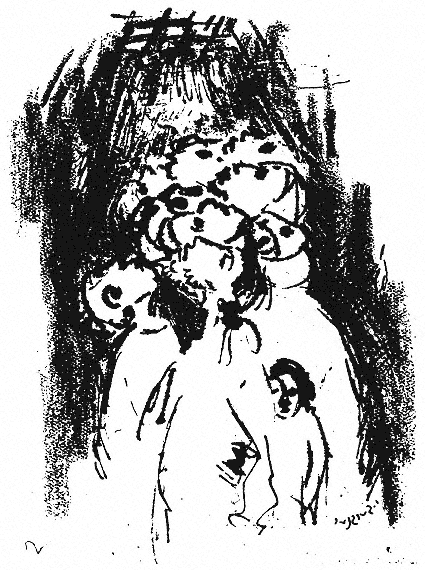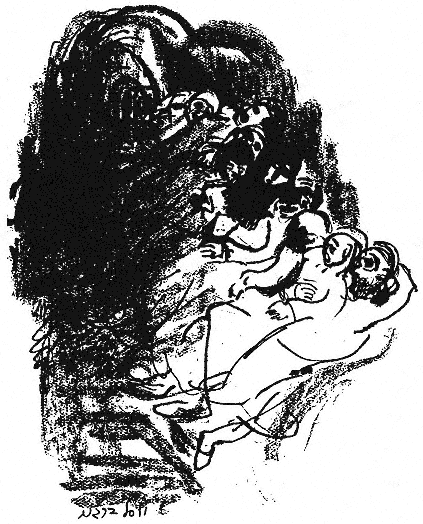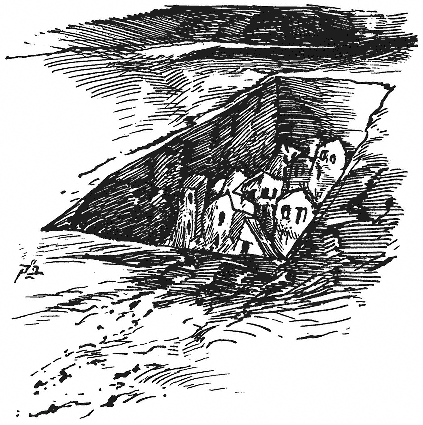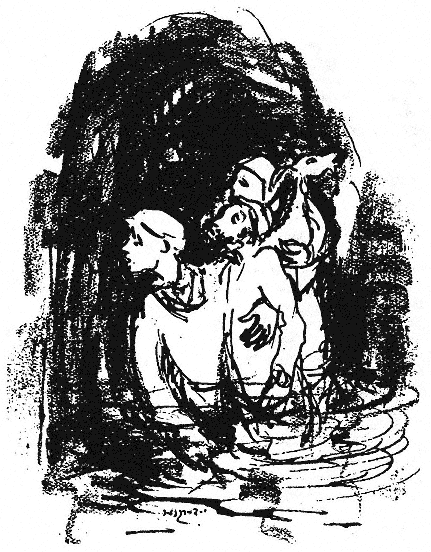Clandestine City (1945–1947)—
(Episodes from the epic poem)
A Nation of Ten
Remember how the autumn sun sent spiders
To spin our houses in a net of fire?
Remember people on that day, disheveled
Half-slaughtered chickens, straying in the mire?
In crucible of Jew-set melted down
A silver candlestick, a chimney dark with age,
A gutter, splintered panes, smouldering wood,
The slaughter-house, the sbul-yard, hatred, rage,
A child in cradle, rifle raised in terror,
And all the figures drowned inside a mirror.
A welding of that crucible, my body
Was buried deep, till night stood at my head.
Was it the rain, tin-tapping over me,
Locking the lightning into drops of lead?
Or did a dream command my sight to cut
Through layers, seek some meaning in the sight?
My every limb opened an eyelid wide
To see through agonies a blinding light.
Glass in my hair, like glowworms turned cold.
I slithered through the alleys ghetto-old.
Yosl Bergner, illustration to Clandestine City .
Two-legged curse, who has invited you
To pose so slyly as a godly splinter?
My question broken off — I heard steps shuffle
Like dry leaves crackling on the eve of winter.
A woman stops, espies me in the ruins,
Life cuddles in her arm, as fresh as dew.
She stretches out her other arm: No stranger,
I am as rich as you, as poor as you.
If now you have no better way, or task,
Come to Clandestine City and don't ask.
What can I lose? I, soaked in searing fires,
Leaping in clay of silence on mute stages,
The last remaining man, the very last
In narrow streets set up like scorching cages.
The air still flashes lightning, stung with sparks,
Riddled by bullets, and with torments filled.
The woman, old and gray now, limped ahead
And lifted from the ground a rusty grill.
The sunshine was unable to pursue us
When we descended in abyss of sewers.
Now, would it ever have occurred to you
That there, where filthy sewer water splashes,
Our sole, our only sanctuary be?
You would have said, that prophet mocks and rash is.
But now, with silly skin on waist and thighs,
I swim in the thick stench, through sticky dark
Of mouse-hole cupolas. To whom to turn?
Where is a place for rest, a ray, a star?
We stopped, the waves rolled over us and moved
And giggled in mouse language: "my beloved."
My memory will not recall how long
I swam through pipes, some narrow and some broad —
An hour? A year? Eventually we came
Upon a clearing outside of the road.
Abandoned sewer, like a cellar clear,
Where murky waters hadn't coursed for years.
But human voices muted the dank calm
And figures faintly in the dark appear
Like shadows cloaked in fog, emerge cloud-gray.
And she who brought me here greets them: Good day!
Yosl Bergner, illustration to Clandestine City .
Black eyeballs in the dark, they sniff my flesh
Like animals around a newborn babe,
Their fingers — graying motions, stretching out
To touch in me a kin lost with no grave.
— A Jew still living? — and a murmur thin:
Are we the last remaining ten? (Above,
An iron grate, we saw a speck of sky
Andhovering in air a sunny dove.)
— Of ten — a breath curled bluish in the hollow —
A nation will arise, to spite the Moloch.
The stripe of sunshine falling through the grate
Flees like a thief where murky pipes their war had.
I see: one shadow has a yellow patch,
Another — tfillin blooming on his forehead.
And in the dark, springs up a shimmering sound:
Swaddled in kerchief, singing baby-cries.
Behind the melody, the tear-filled echo —
A child! — How could we then believe our eyes?
But she who brought me here began to tell:
I found the trembling nestling in a well.
The child was sobbing loud. Its echo went
To seek redemption far, in other worlds.
— How goodly are your tents, Ma tovu, Jacob,
Somebody rumbles on, when tears are pearls.
That moment, what would be the baby's fate
None in Clandestine City dared imagine.
A hand swam in out of the cosmic shores,
Transforming our last minyan into legend.
Reality thus met me underground
When I departed from my slaughtered town.
The Sewers
We were just ten of us in underground,
Each of the shadows' dreams cut us asunder.
The darkness slashed me with an ancient sword,
With copper vaults, with dark medieval wonder.
Little by little, in each moving shadow
I smelled myself — the part of me I lack.
I tasted of his mind, kneaded myself in him,
My world did not so gloomily wail back.
And as I yearned for Vega and for Sirius —
They flashed before my eyes, bright and mysterious.
And like the pupil of my eye, growing familiar
With all the dark, has nimbly turned it into
White light that window-covered our black lair,
Where the reflections of a thousand splinter
Rivulets waved — so an outlandish force
Has wrestled with the dreadful stench, abhorring,
And finally exchanged it, as forever,
For scent of fresh mown hay on a cool morning,
For scent of Friday nights, of rolls with cream,
That each of us still savored in his dream.
The sewers, channels, pipes are different,
Like highways, roads, and lanes in forests deep.
(We shall discuss it clearly in its place.)
Most times the water is subdued, you creep
Out for a "stroll." In raintime, it will rise
With shrieks and whistles like a witch's song,
Flow over through oblique cracks, slits, and holes
Into the "storm canal," neck-slim and long,
Roaring under the broadest street, it goes.
Galloping like a horde of buffalos
Yosl Bergner, illustration to Clandestine City .
And thundering down into another stream,
Runs into the Viliya. Brotherly
Accompanied by various side pipes, branching
From under narrow streets that suddenly
Contribute to the flood in time of rain.
The flow brings from all backstreet yards
Eternal filth like an infernal fire,
Strikes on your swooning brow — hard, stinking shards.
At night a smaller stream, mute, barely born,
The pipes — they gurgle soft like organs torn.
And in a pipe where "Springs of Vingree Street"
Flow all together, sweeping their discards,
And branch out underground as stammering strings,
There in a pipe not wide, three-quarter yards,
Above the junction — hollowed out a moon,
A hole in metal ceiling. Through the hole
You can creep in, without the slightest danger,
Into a cavern, walk erect and bold.
This is our own, dug out and safe Malina.
We dwell here under wings of the Shekhina. [40]
Who are the "we" that secretly inhabit
The water palaces that may astound?
I'll modestly describe here all the figures.
I'll tell the truth as witnessed underground:
Elul, [41] five thousand seven hundred three.
No Jews in Vilna. The last transports left
Not to return, to sounds of autumn wailing.
The Teacher Gdalye jumped out through a cleft,
Searched for a hiding, slid down to this trench.
Slid down — and fraternized with all the stench.
Next morning — he encountered someone, Folye,
With him his mother, the leaseholder Esther,
And plaited close his further lot with theirs.
The mama, used to dark holes that would nest her,
Crept out of swampy night into the air
And gathered among ruins, empty houses,
Trampled potatoes scattered in the mud
And peas. Her generosity arouses
Our praise for all the presents that she shares.
There is a lot to tell of all her cares.
S. Bak, illustration to Sutzkever's ghetto poems.
Meanwhile, there came Arona, refugee
From Hamburg, does not like our Yiddish speech,
He sees the language as the greatest danger,
Caresses his own fate in cotton. Each
A character. The water roared and thundered
(A sign that in the city rain is falling),
And brought, as on a swaying motorcycle
Of waves, a guy out of the blue came calling.
He leaps down from the saddle, like hot news:
"I'm Doctor Lippman! You don't know me, Jews?"
And then they found in a calm, far-off corner,
Where only moon-mice splash and moon-bats hover,
A man enshrouded in his tfillin bands,
His countenance — the face of a cadaver.
His locks slathered with lime. Instead of clothes —
His body wrapped in parchment. The hermit Nathan.
Perhaps an angel pointed out the secret
Where Jews hide in the earth, to show his faith in
His fate. The parchment letters worn outside,
Their meaning is unknown here, far and wide.
Meanwhile did Esther, "hunting" for some food,
Bring from outside a shining ray of fate,
A girl, chased in a free-for-all domain.
Her name is Debby. Then, under a grate,
Did Deborah discover a blind man.
And later came to our retreat, in fear,
A pregnant woman, escaped from a mass grave
With snow-white hair. We call her Kreyne here,
Her story will be told, but where and when?
And I was number ten. A group of ten.
The city sank. The world is topsy-turvy.
A dozen buried characters remained
Where just a moldy demon lurks in wait.
But right before our lips, hope moved unchained,
An unseen rose … incessantly it called,
Winking and beckoning with mystery of hues,
Opened a morn in morning. But before you could
Touch with your fingers her delicate dews —
The rose has vanished. It glimmers from afar,
On the far side of death, a shining star.
Yosl Bergner, illustration to Clandestine City .
The House on Vingree
Nation often! With due consideration,
Folye distributed our functions here:
To carry out precisely, till the hour
Of our release from sewers will appear.
"You, Gdalye, Teacher, write a chronicle
For future generations, day by day.
You, Lippman, Doctor, guard us if you can from
All illness, you are good at that, they say.
Make sure that we all wash, keep up our will.
Make sure the drinking water does not kill."
"And you who are about to be a mother,"
So Folye mumbled into Kreyne's ear,
"You feed the baby that my mother brought
The other day. Get used, it will endear
Itself to you. I'm sure the doctor will
Help you. A cradle we will shortly get,
A primus, and a sheet, a lamp of oil,
I'll bring a jar of milk, rely on that.
It's said and done. The worries of a child
Need mother's hand, caressing, firm, and mild."
"And you," he went on, "Mister So-and-So,"
To the blind man who didn't give his name —
"You'll guard the entrance, and you must assure
That sudden torrents do not come and maim
Our hiding place. And you may sleep at night,
When we are all awake, you'll be alert
In daytime, guard our house, hold in your hand
The pulse of sewers, hear their noise and dirt.
If a suspicious sound you hear, beware
And pull the hanging cord I shall prepare."
The refugee Arona, trained in finance,
Folye appointed to become the master
Of gathering money from us all and hiding
Our state treasury somewhere in plaster.
Aside from that, he's crowned to be the guard
Of the larder. We'll try to get some bread
And nimbly he'll distribute it to all
So that the hunger will not strike us dead.
At first the refugee was skeptical a bit
But then, no questions asked, accepted it.
"And you," Foyle appealed to Rabbi Nathan,
"Decide your task." But the old hermit, gray,
Still wrapped around in his tin parchment,
Invisibly crept closer up, to say:
"My friends, allow me to become your cobbler,
I want to help with something, good and sound."
We heard his words as a refined example
Of human loyalty not to be found.
We looked with joy and fear, with awe and rage,
With admiration for the hoary sage.
"And you will wash our clothes, our dirty shirts,"
Folye has whispered in young Debby's ear;
"If difficult, I'll gladly help, we must.
You comrade poet, come light up our drear
With poetry. A nation of just ten
Is still a nation. Food is Mama's task.
And I will bring the warm hard bread of vengeance,
The victim never must forget his ax."
This is how Folye, with his reasoned gait,
Divided for each one his share of fate.
Written in Moscow-Lodz-Paris, 1945–1947
